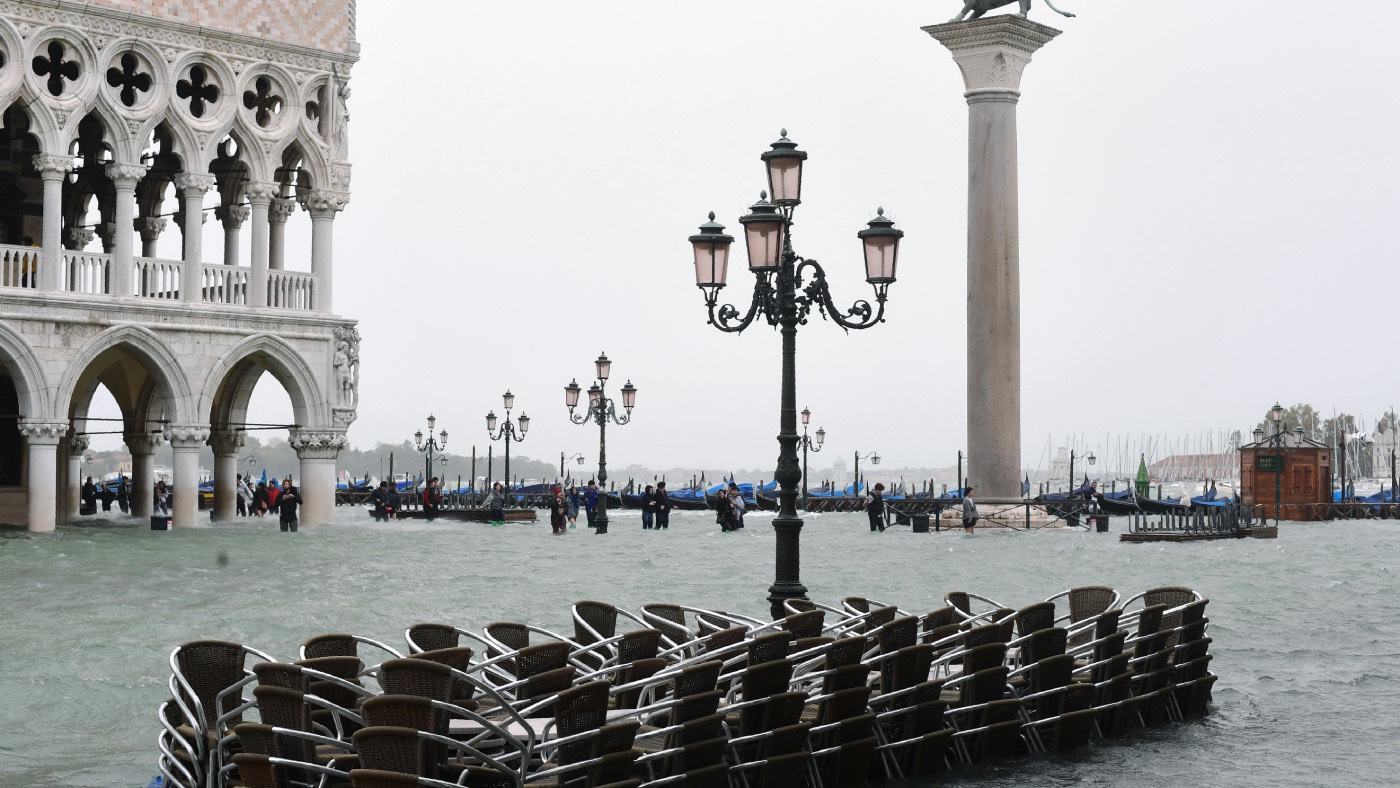Venice mayor blames climate change for ‘apocalyptic’ floods
Luigi Brugnaro calls for action after high tides kill two

A free daily email with the biggest news stories of the day – and the best features from TheWeek.com
You are now subscribed
Your newsletter sign-up was successful
Venice was “on the verge of apocalypse” after the highest tide in more than 50 years left much of the Italian city under water, a local official has said.
Two people died as the tide peaked at 187cm at 10.50pm on Tuesday, just short of the 194cm seen in 1966.
The BBC says the deaths came on the island of Pellestrina, a thin strip of land that separates the lagoon from the Adriatic Sea. A man was electrocuted as he tried to start a pump in his home, and a second person was found dead in a different part of the island.
The Week
Escape your echo chamber. Get the facts behind the news, plus analysis from multiple perspectives.

Sign up for The Week's Free Newsletters
From our morning news briefing to a weekly Good News Newsletter, get the best of The Week delivered directly to your inbox.
From our morning news briefing to a weekly Good News Newsletter, get the best of The Week delivered directly to your inbox.
A shopkeeper told Italy’s public broadcaster Rai: “The city is on its knees.”
The mayor says the flooding is a direct result of climate change. The highest water levels in the region in more than 50 years would leave “a permanent mark”, said Venice Mayor Luigi Brugnaro. “Now the government must listen. These are the effects of climate change... the costs will be high.”
–––––––––––––––––––––––––––––––For a round-up of the most important stories from around the world - and a concise, refreshing and balanced take on the week’s news agenda - try The Week magazine. Get your first six issues for £6–––––––––––––––––––––––––––––––
Brugnaro said the damage was “huge” and “dramatic”, and that he would declare a state of disaster, warning that a project to help prevent the Venetian lagoon suffering devastating floods “must be finished soon”.
A free daily email with the biggest news stories of the day – and the best features from TheWeek.com
The Daily Mail reports that locals claim corruption has repeatedly delayed a barrier protection system which could have prevented the disaster.
The episode was historic. St Mark’s Basilica was flooded for only the sixth time in 1,200 years, according to church records. Pierpaolo Campostrini, a member of St Mark’s council, said four of those floods had now occurred within the past 20 years.
The mayor said the iconic landmark suffered “grave damage,” in the flooding with fears of structural damage to the basilica’s columns.
-
 The environmental cost of GLP-1s
The environmental cost of GLP-1sThe explainer Producing the drugs is a dirty process
-
 Nuuk becomes ground zero for Greenland’s diplomatic straits
Nuuk becomes ground zero for Greenland’s diplomatic straitsIN THE SPOTLIGHT A flurry of new consular activity in Nuuk shows how important Greenland has become to Europeans’ anxiety about American imperialism
-
 ‘This is something that happens all too often’
‘This is something that happens all too often’Instant Opinion Opinion, comment and editorials of the day
-
 The plan to wall off the ‘Doomsday’ glacier
The plan to wall off the ‘Doomsday’ glacierUnder the Radar Massive barrier could ‘slow the rate of ice loss’ from Thwaites Glacier, whose total collapse would have devastating consequences
-
 Can the UK take any more rain?
Can the UK take any more rain?Today’s Big Question An Atlantic jet stream is ‘stuck’ over British skies, leading to ‘biblical’ downpours and more than 40 consecutive days of rain in some areas
-
 As temperatures rise, US incomes fall
As temperatures rise, US incomes fallUnder the radar Elevated temperatures are capable of affecting the entire economy
-
 The world is entering an ‘era of water bankruptcy’
The world is entering an ‘era of water bankruptcy’The explainer Water might soon be more valuable than gold
-
 Climate change could lead to a reptile ‘sexpocalypse’
Climate change could lead to a reptile ‘sexpocalypse’Under the radar The gender gap has hit the animal kingdom
-
 The former largest iceberg is turning blue. It’s a bad sign.
The former largest iceberg is turning blue. It’s a bad sign.Under the radar It is quickly melting away
-
 How drones detected a deadly threat to Arctic whales
How drones detected a deadly threat to Arctic whalesUnder the radar Monitoring the sea in the air
-
 ‘Jumping genes’: how polar bears are rewiring their DNA to survive the warming Arctic
‘Jumping genes’: how polar bears are rewiring their DNA to survive the warming ArcticUnder the radar The species is adapting to warmer temperatures